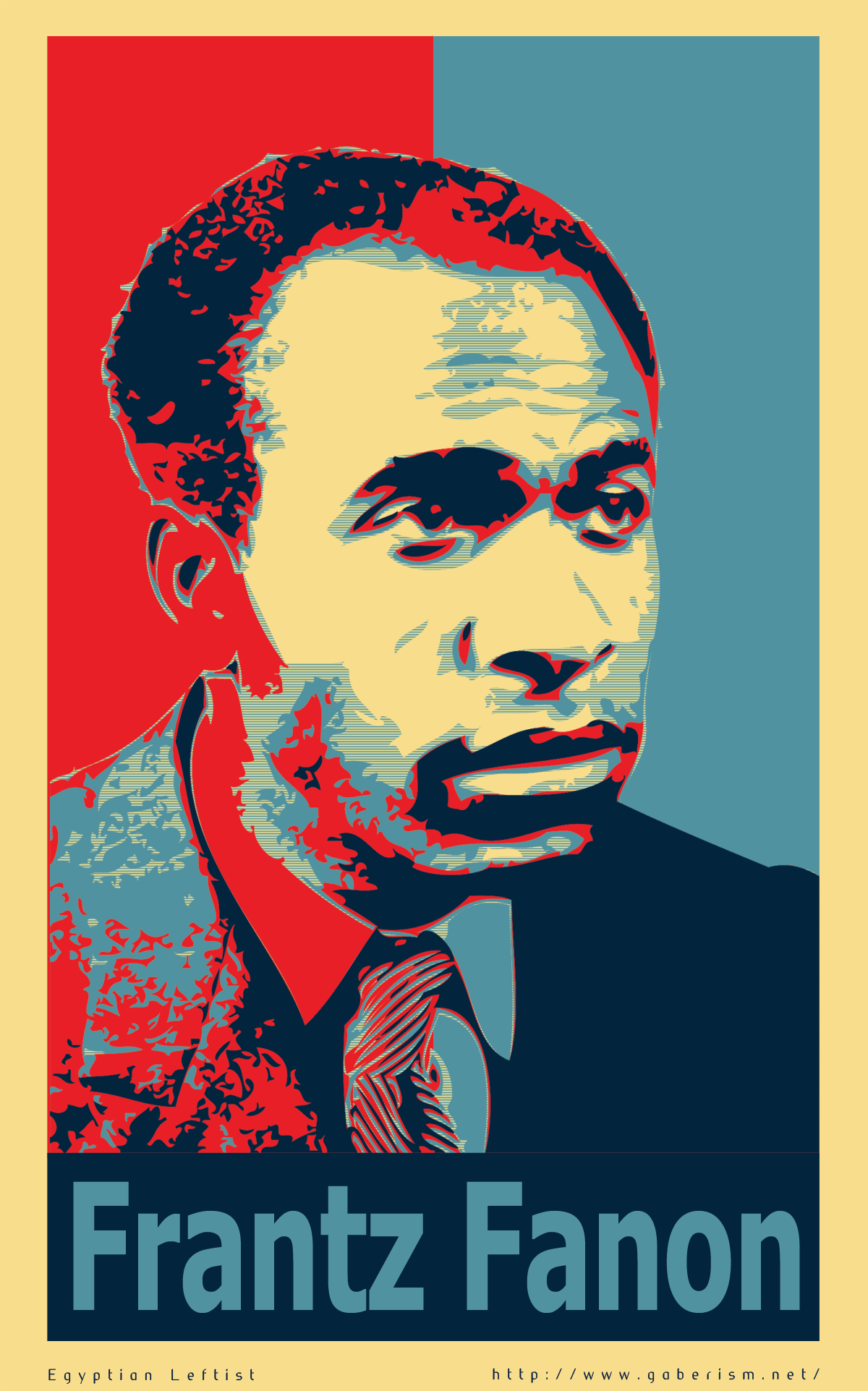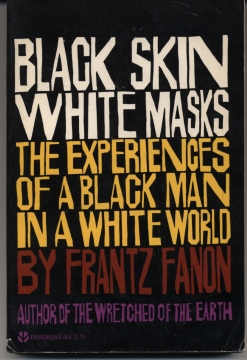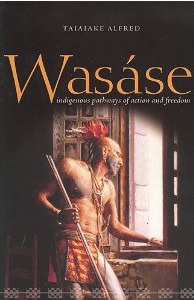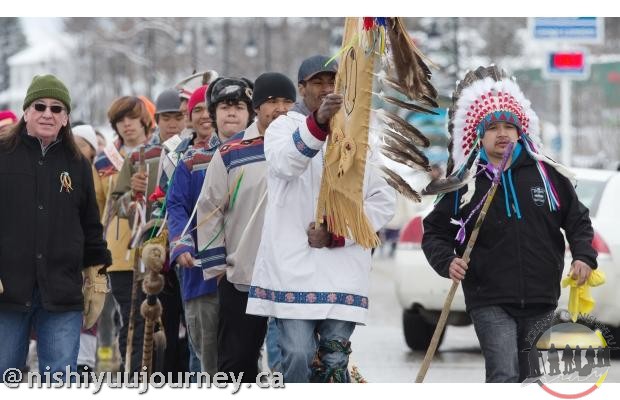Indigenous and solidarity activists in the Vancouver Idle No More movement may have seen Glen Coulthard in their midst. Some of the debates that emerged in the Idle No More movement about the strategy of finding a place “at the table” with the Federal government are powerfully addressed in Glen’s various writings about the pitfalls of the politics of recognition.
In 2006, Glen co-edited with Taiaiake Alfred and Deborah Simmons a special Indigenous Resurgence issue of the print magazine New Socialist. We are reprinting Glen’s article in that publication, since it remains a reference point for his recent reflections on Idle No More — these can be found on You Tube, on the Decolonization: Indigeneity, Education and Society blog, and on Rabble.ca. – New Socialist Webzine editors
Over the last 30 years, the self-determination efforts and objectives of indigenous peoples in Canada have increasingly been cast in the language of “recognition.” Consider, for example, the latest policy position on self-determination published by the Assembly of First Nations (AFN) in the spring of 2005. According to the AFN document, “a consensus has emerged […] around a vision of the relationship between First Nations and Canada which would lead to strengthening recognition and implementation of First Nations’ governments.”
This “vision,” the AFN goes on to explain, expands on the core principles outlined in the 1996 Report of Royal Commission on Aboriginal Peoples: recognition of the nation-to-nation relationship between First Nations and the Crown; recognition of the equal right of First Nations to self-determination; recognition of the Crown’s fiduciary obligation to protect Aboriginal treaty rights; recognition of First Nation’s inherent right to self-government; and recognition of the right of First Nations to benefit from the development of their lands and resources.
In this article I employ the work of anti-colonial revolutionary and psychiatrist Frantz Fanon to challenge the idea that the colonial relationship between indigenous peoples and the Canadian state can be transformed via a politics of recognition. I take “politics of recognition” to refer to the now expansive range of recognition-based models of liberal pluralism that seek to “reconcile” indigenous claims to nationhood with Crown sovereignty by accommodating indigenous identities in some form of renewed relationship with (and within) the Canadian state.
Although these models vary in both theory and practice, most tend to involve the delegation of land, capital and political power from the state to indigenous communities through land claims, economic development and self-government processes. Against this vision, I argue that instead of ushering in an era of peaceful coexistence grounded on the ideal of mutuality, the politics of recognition in its contemporary form promises to reproduce the very configurations of colonial power that indigenous peoples have historically sought to transcend.
Recognition and Freedom
The increase in recognition demands made by indigenous and other marginalized minorities over the last three decades has prompted an explosion of intellectual work which has sought to unpack the ethical and political significance of these types of claims. To date this literature has tended to focus on the contested relationship between the recognition of cultural distinctiveness on the one hand, and the freedom and well-being of marginalized individuals and groups living in ethnically diverse states on the other.
At the center of this debate has been the influential work of Canadian political philosopher, Charles Taylor. In his 1992 essay “The Politics of Recognition,” Taylor argues that political communities such as Canada ought to provide recognition and protection for certain sub-state cultural and national communities because it is within and against the “horizon” of these communities that humans come to develop their identities, and thus the capacity to make sense of their lives and life choices.
Taylor’s reasoning goes something like this: as culturally situated beings we do not develop our identities in “isolation” – rather we form them through complex “relations of recognition” with others. However, given that our identities are formed in this manner, it also follows that they can be significantly deformed when these processes run awry. In this sense, our identities are not only shaped by recognition, but also its absence, “often by the misrecognition of others.”
Thus Taylor writes: “A person or a group of people can suffer real damage, real distortion, if the people or society around them mirror back to them a confining or demeaning or contemptible picture of themselves. Nonrecognition or misrecognition can inflict harm, can be a form of oppression, imprisoning one in a false, distorted, and reduced mode of being.” It is this idea that unequal relations of recognition can impede human freedom and flourishing that continues to serve as one of the main theoretical justifications for state policies geared toward the protection of indigenous cultural difference.
Recognition in Colonial Contexts
Interestingly, in the second half of “The Politics of Recognition” Taylor identifies Frantz Fanon as one of the first people to clearly outline the role that misrecognition plays in propping up relations of colonial domination. I don’t dispute Taylor’s affirmation of Fanon’s work in theorizing the subjectivity of the oppressed. However, he is mistaken in invoking Fanon to suggest that by institutionalizing a liberal regime of mutual recognition we can somehow transcend the breadth of power at play in colonial systems of domination.
 Fanon’s concern with the relationship between human freedom and equality in relations of recognition represents a central and reoccurring theme in much of his work. But his most concentrated examination of this relationship occurs in his 1952 text, Black Skin, White Masks (BSWM). There Fanon shows that a colonial system of governance that does not rely entirely on the execution of force must entice indigenous peoples to identify with the profoundly asymmetrical forms of recognition either imposed on or granted to them by the colonial-state and society.
Fanon’s concern with the relationship between human freedom and equality in relations of recognition represents a central and reoccurring theme in much of his work. But his most concentrated examination of this relationship occurs in his 1952 text, Black Skin, White Masks (BSWM). There Fanon shows that a colonial system of governance that does not rely entirely on the execution of force must entice indigenous peoples to identify with the profoundly asymmetrical forms of recognition either imposed on or granted to them by the colonial-state and society.
In essence, Fanon argues that in contexts of domination (such as colonialism), the terms of recognition are usually determined by and in the interests of the oppressor. Moreover, over time oppressed populations tend to develop what he called “psycho-affective” attachments to these master-sanctioned forms of recognition, and that this attachment is essential in maintaining the economic and political structure of colonial relations themselves. For Fanon, then, colonialism can be said to operate on two levels: it includes “not only the interrelations of objective historical conditions but also human attitudes to these conditions.” Fanon argues that it is this interplay between the objective and subjective realms of colonialism that ensures its stability over time.
With respect to the subjective dimension, BSWM painstakingly outlines the multiple ways in which those “attitudes” conducive to colonial rule are cultivated amongst the colonized through the unequal exchange of institutionalized and interpersonal patterns of recognition between the colonial society and the indigenous population. Fanon’s work reveals how, over time, colonized populations tend to internalize the derogatory images imposed on them by their colonial “masters.” As a result of this process, these images, along with the structural relations with which they are entwined, come to be recognized or endured as more or less natural.
This last point is made agonizingly clear in one of the most famous passages from BSWM, where Fanon shares an alienating encounter on the streets of Paris with a little white child. “Look, a Negro!” Fanon recalls the girl saying, “Moma, see the Negro! I’m frightened! frightened!” At that moment the imposition of the child’s gaze “sealed” Fanon into a “crushing objecthood.” In his own words: “I subjected myself to an objective examination, I discovered my blackness, my ethnic characteristics; and I was battered down by tom-toms, cannibalism, intellectual deficiency, fetishism, [and] racial defects.” Instead of being acknowledged as a “man among men,” the child’s recognition reduced Fanon to “an object among other objects.”
Left as is, Fanon’s insights into the ultimately objectifying nature of colonial recognition appear to square nicely with the politics of recognition as it is conceived of and practiced in Canada today. For example, although Fanon never uses the word himself, he does seem to be describing the debilitating effects associated with misrecognition in the sense that Taylor and others use the term. In fact, BSWM is littered with passages that illustrate the innumerable ways in which the imposition of the settler’s gaze can inflict damage on indigenous society at both the individual and collective levels. However, a close reading of Fanon’s work renders problematic the liberal-recognition approach in several interrelated and crucial respects.
The Fanonian Critique
The first problem has to do with the liberal-recognition approach’s failure to adequately confront the dual structure of colonialism itself. Fanon insists, for example, that in order to transform a colonial configuration of power one has to attack it at both levels of operation: the objective and the subjective. This point is made at the outset of BSWM and reverberates throughout all of Fanon’s work. 
A significant portion of BSWM is committed to diagnosing the “psychological” dimension of colonialism. But Fanon also emphasizes in his introduction that strategically, any “effective disalienation” of the colonized subject can only happen if one also addresses the “social and economic realities” of colonial rule. Fanon correctly situates “colonial-capitalist” exploitation alongside misrecognition and alienation as one of the foundational sources of imperial domination.
Of course, Fanon was enough of a Marxist to understand that capitalist economic relations play a foundational role in exacerbating asymmetrical relations of recognition. However, he was also much more perceptive than many Marxists in his insistence that the subjective realm of colonialism had to be the target of strategic transformation along with the socioeconomic structure. The colonized person “must wage war on both levels,” in Fanon’s view. “Since historically they influence each other, any unilateral liberation is incomplete, and the gravest mistake would be to believe in their automatic interdependence.” Attacking colonial power on one front, in other words, does not guarantee the subversion of its effects on the other.
Fanon’s insights here immediately expose the limits of the politics of recognition for restructuring indigenous-state relations in Canada. This project has largely been conceived of in terms of reformist state redistribution schemes like granting certain “cultural rights” and concessions to indigenous communities through self-government and land claims processes. Although this approach may alter some of the effects of colonial-capitalist exploitation and domination, it does little to address their generative structures – in this case the racist capitalist economy and the colonial state. Seen from this angle, the contemporary politics of recognition simply leaves one of the two operative levels of colonial power identified by Fanon untouched.
The second key problem with the politics of recognition’s proposed remedy for colonial injustice has to do with the subjective realm of colonial power. Here it is important to note that most recognition-based proposals – whether we’re talking about the recommendations of Charles Taylor or the Royal Commission on Aboriginal Peoples – rests on the assumption that the flourishing of indigenous peoples as distinct and self-determining agents is dependent on their being granted recognition and institutional accommodation by and within the settler-state apparatus. As sociologist Richard Day has put it, under these models, recognition is conceived of as a “gift” bestowed from a superior identity to an inferior one.
For Fanon, there are at least two problems underlying the idea that freedom and independence can be achieved via a gift of recognition. The first involves the relationship that he draws between struggle and the disalienation of the colonized individual. Simply stated, for Fanon it is through struggle and conflict (and for the later Fanon, violent struggle and conflict) that the colonized come to be rid of the “arsenal of complexes” driven into the core of their being through the colonial process.
Struggle, in other words, serves as a mediating force through which the colonized come to shed their colonial identities, thus restoring them to their “proper place.” In contexts where recognition is conferred without struggle, this fundamental self-transformation cannot occur, and as a result authentic freedom is denied. Although the formal political structure of domination may change in this process (the colonized are afforded “rights,” for example), the subjectivity of the Native remains the same – they remain colonized at the level of their being.
However, when Fanon speaks of a lack of struggle in the decolonization movements of his day he doesn’t mean to suggest that the colonized in these contexts simply remained passive recipients of colonial practices. He readily admits, for example, that the colonized may indeed fight “for Liberty and Justice.” However, when this fight is carried out in a manner that does not pose a foundational challenge to colonial power as such – which, for Fanon, will always involve struggle and conflict – then the best the colonized can hope for is “white liberty and white justice; that is, values secreted by [their] masters.”
This brings us to the second major problem identified by Fanon: without conflict and struggle constituting a central feature of the decolonization movement (a) the terms of recognition tend to remain the property of those in power to grant to their inferiors in ways that they deem appropriate, and (b) under these conditions, the indigenous population often comes to see the limited and constrained terms of recognition conferred to them by their colonial masters as their own. In effect, the colonized come to identify with “white liberty and white justice.” Either way, for Fanon, the colonized will have failed to re-establish themselves as truly self-determining, that is, as creators of the terms of their own recognition and in accordance with their own values.
Fanon’s Insights Today
Anyone familiar with the power dynamics that structure the Aboriginal rights movement in Canada should immediately see the applicability of Fanon’s insights here. We needn’t expend much effort to elicit the countless ways in which the liberal discourse of recognition has been limited and constrained by the state, politicians, corporations and the courts in ways that pose no fundamental challenge to the colonial relationship.
Indeed, over the last 30 years the Supreme Court of Canada has consistently refused to recognize indigenous peoples’ equal and self-determining status. This is based on the court’s adherence to legal precedent founded on the white supremacist myth that indigenous societies were too primitive to bear fundamental political rights when they first encountered European powers. Even though the Court has secured an unprecedented degree of recognition for certain “cultural” practices within the state, it has nonetheless failed to challenge the racist origin of Canada’s assumed authority over indigenous peoples and their territories.
The political and economic ramifications of this legal move are clear-cut. In Delgamuukw v. British Columbia, for example, it was declared that any residual Aboriginal rights that may have survived the unilateral assertion of Crown sovereignty could be infringed upon by the federal and provincial governments so long as this action could be shown to further a “compelling and substantial legislative objective” consistent with the “fiduciary relationship” between the state and Aboriginal peoples.
What “substantial objectives” might justify infringement? According to the Court, virtually any profitable economic venture, including the “development of agriculture, forestry, mining, and hydroelectric power, the general economic development of the interior of British Columbia, protection of the environment or endangered species and the building of infrastructure and the settlement of foreign populations to support those aims.” So today it appears, as much as it did in Fanon’s day, that colonial powers will only recognize the collective rights and identities of indigenous peoples insofar as this recognition does not obstruct the imperatives of state and capital.
But the above examples confirm only one aspect of Fanon’s insight into the problem of recognition when applied to the colonial setting: namely, the limitations that it runs up against when pitted against these overtly structural expressions of colonial power. Can the same be said for the subjective dimension of colonial power relations?
With respect to the forms of racist recognition pounded into the psyches of indigenous peoples through the institutions of the state, church, schools, media, and by racists within the dominant society, the answer is surely yes. Countless studies, novels and autobiographical narratives have outlined, in painful detail, how these expressions of recognition have saddled indigenous people with low self-esteem, depression, alcohol and drug abuse, and violent behaviours directed both inward against the self and outwards toward others.
 Similarly convincing arguments have also been made about the types of recognition offered to indigenous communities through the law, self-government packages, land claims and economic development programs. The recent work of Taiaiake Alfred, for example, has shown how the power relations within and against which indigenous demands for recognition are made can subtly shape the subjectivities and worldviews of the indigenous claimants involved.
Similarly convincing arguments have also been made about the types of recognition offered to indigenous communities through the law, self-government packages, land claims and economic development programs. The recent work of Taiaiake Alfred, for example, has shown how the power relations within and against which indigenous demands for recognition are made can subtly shape the subjectivities and worldviews of the indigenous claimants involved.
The core problem, of course, is that the structural and discursive settings within which recognition claims are articulated and assessed are by no means neutral: they are profoundly power-laden, and almost always to the detriment of indigenous claimants. As such they have the ability to mould how indigenous people think and act, not only in relation to the topic at hand (the recognition claim) but also in relation to themselves and others.
This is what Alfred means when he suggests that, over time, legal approaches tend to produce Aboriginal “citizens” whose rights and identities become defined by the colonial state. Similarly, economic development approaches produce Aboriginal capitalists whose thirst for profit come to outweigh their ancestral obligations to the land and to others. And land claims processes produce Aboriginal property owners whose territories, and thus whose very identities, become subject to expropriation and alienation. These processes signify the erosion of the most traditionally egalitarian aspects of indigenous ethical systems, ways of life and forms of social organization.
Toward a Politics of Doing
I have argued here that Fanon’s insights into the subjectifying nature of colonial recognition are as applicable today to the liberal “politics of recognition” as they were fifty years ago, when he first formulated his ideas on the matter. Fanon’s dual-structured conception of colonial power still captures the subtle (and not so subtle) ways in which a system of imperial domination that does not sustain itself exclusively by force is reproduced over time.
But if colonial power is dispersed much more diffusely today, how do we go about resisting it? Fanon suggests that those of us struggling against colonialism must “turn away” from the assimilative lure of the politics of recognition and begin to direct our struggles toward our own on-the-ground strategies of freedom. Today this process will (and must) continue to involve some form of critical individual and collective self-recognition on the part of indigenous peoples. In my mind, this self-affirmative process must be carried out for everyone’s sake, because indigenous societies have truths to teach the Western world about the establishment and preservation of relationships between peoples and the natural world that are profoundly non-imperialist.
Glen Coulthard is a Dene activist, and teaches First Nations Studies and Political Science at University of British Columbia. He is currently writing a book on indigenous peoples and recognition politics in Canada.


